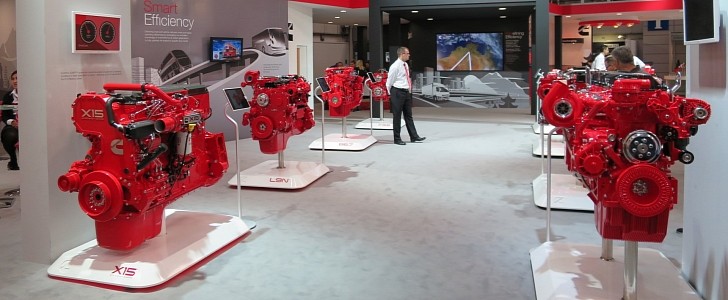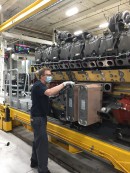Electric vehicles might not be everyone’s darling and in some cases - for instance, it might not be practical to have commercial vehicles and other heavy-duty equipment run on batteries. This leaves the door open for the combustion engine to live longer, but running on hydrogen. With Cummins interested to develop hydrogen-powered internal combustion engines, the quest for a clean combustion engine just got a lot more serious.
In case you didn’t know, there is a long battle going on to save the big-oil business model by switching internal combustion engines to burn hydrogen instead of fossil fuels. How does this help the oil companies, you might ask? In two ways. First, they will get to keep most of their existing infrastructure. And, second, most of the hydrogen that is produced today is the result of a power-hungry process that needs fossil fuels mostly.
This battle goes hand in hand with those who believe the internal combustion engine has not yet spoken its last words. One way that promises to make clean combustion engines is to convert them to run on hydrogen. A lot of effort has been put into developing hydrogen-powered ICEs, but we still have to see a single commercial application. It won’t be long though, especially as Cummins joined this effort.
In theory, the internal combustion engines will need only minor modifications to run on hydrogen. This makes them a low-cost solution for heavy-duty applications where battery-electric equipment cannot meet the operational requirements. This goes nicely with the fact these engines work with the same transmissions and the same service networks, basically being a drop-in replacement for diesel engines.
Cummins believes their experience in developing ignition engines will prove crucial in the hydrogen ICE race. For instance, hydrogen engines need a dedicated platform to address the inherent problems like performance limitations and other compromises associated with converting today's diesel or natural gas engines to run on hydrogen. Cummins designed an optimized combustion chamber for fuel mixing, charge motion, and turbulence generation in the engine. This is critical for fast hydrogen combustion to maximize power density and efficiency.
It’s important to learn that hydrogen only solves the CO2 problem, while all others are still to be addressed. Burning needs air, and air contains nitrogen so burning will result in NOx emissions that are harmful to human beings. Besides, the hydrogen engines still need lubrication. Part of that oil gets also burnt in the combustion chambers, resulting in more harmful emissions. You see how there is no true clean combustion engine. But hopefully, the hydrogen will provide a transition path that is less abrupt than the sudden switch to electricity.
This battle goes hand in hand with those who believe the internal combustion engine has not yet spoken its last words. One way that promises to make clean combustion engines is to convert them to run on hydrogen. A lot of effort has been put into developing hydrogen-powered ICEs, but we still have to see a single commercial application. It won’t be long though, especially as Cummins joined this effort.
In theory, the internal combustion engines will need only minor modifications to run on hydrogen. This makes them a low-cost solution for heavy-duty applications where battery-electric equipment cannot meet the operational requirements. This goes nicely with the fact these engines work with the same transmissions and the same service networks, basically being a drop-in replacement for diesel engines.
Cummins believes their experience in developing ignition engines will prove crucial in the hydrogen ICE race. For instance, hydrogen engines need a dedicated platform to address the inherent problems like performance limitations and other compromises associated with converting today's diesel or natural gas engines to run on hydrogen. Cummins designed an optimized combustion chamber for fuel mixing, charge motion, and turbulence generation in the engine. This is critical for fast hydrogen combustion to maximize power density and efficiency.
It’s important to learn that hydrogen only solves the CO2 problem, while all others are still to be addressed. Burning needs air, and air contains nitrogen so burning will result in NOx emissions that are harmful to human beings. Besides, the hydrogen engines still need lubrication. Part of that oil gets also burnt in the combustion chambers, resulting in more harmful emissions. You see how there is no true clean combustion engine. But hopefully, the hydrogen will provide a transition path that is less abrupt than the sudden switch to electricity.






